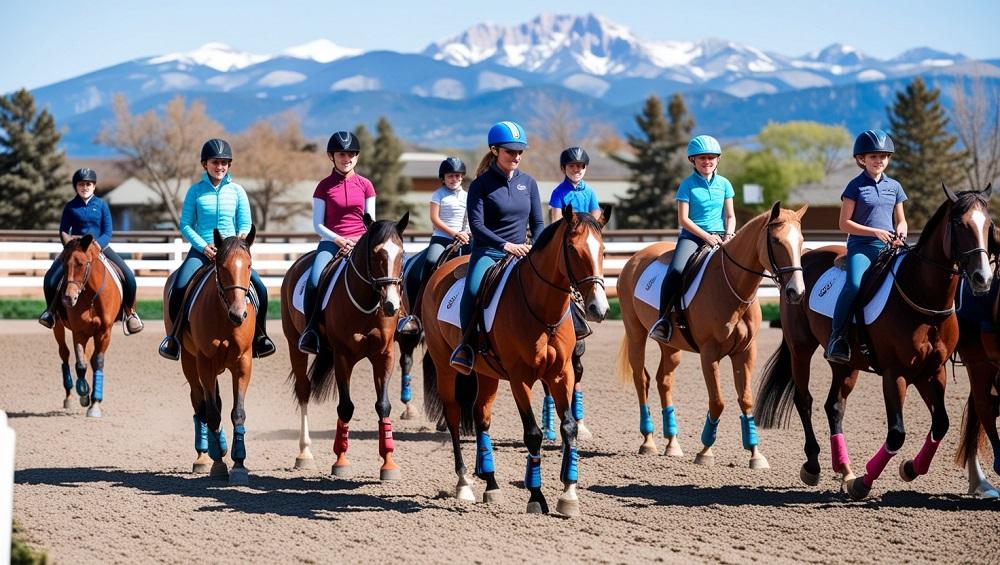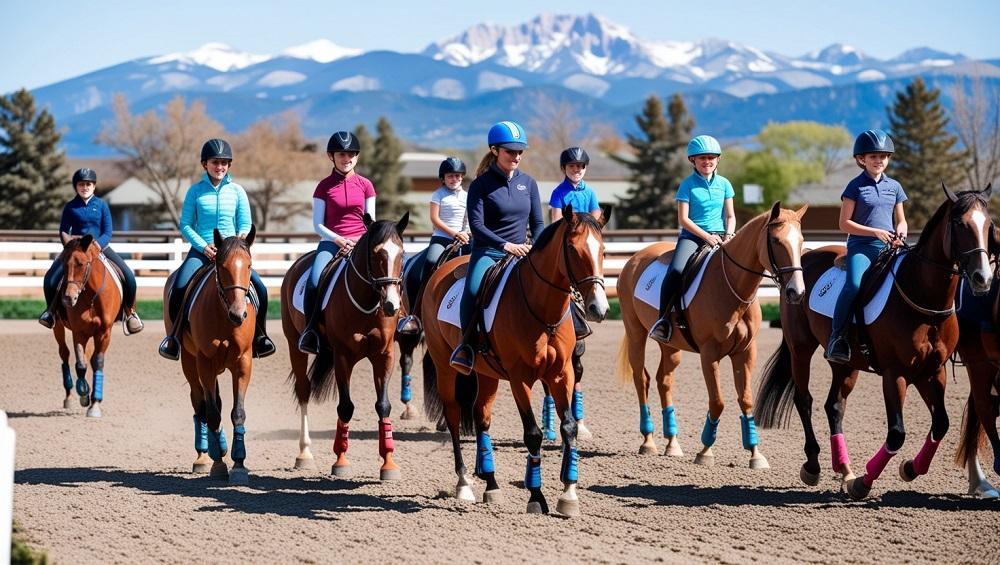Beginner to Expert: Best Horse Riding Lessons in Denver

Beginner to Expert: Best Horse Riding Lessons in Denver

A Thriving Equestrian Scene in Colorado
Colorado’s horse riding tradition runs deep. The state’s open landscapes, seasonal climate, and deeply rooted Western heritage have long made it a haven for equestrian enthusiasts. In and around Denver, riding remains an accessible and active part of community life, with clubs, arenas, and stables scattered across both city outskirts and rural pockets.
Sedalia and Littleton in particular are home to riding facilities that balance professionalism with a sense of belonging. Lessons cater to both first-timers and those seeking to sharpen technique or prepare for competition. The sheer variety of schools reflects a culture that welcomes all levels — from casual riders to future competitors.
Polo and eventing are growing subcultures in Colorado's horse world, drawing in both spectators and active participants. Facilities supporting these disciplines, like the Denver Polo Club, bridge the gap between sport and lifestyle. While dressage and show jumping still dominate many formal programmes, the local appetite for fast-paced team sports is increasing — opening up new learning pathways for those who wish to move beyond traditional riding lessons.
Some clubs also offer clinics hosted by nationally recognised trainers throughout the year. These events provide aspiring riders with a chance to gain exposure to different styles and philosophies. Whether working on flatwork precision or polework confidence, these clinics help shape well-rounded equestrians who are better prepared for progression.
Why Start Horse Riding in Denver?
Riding in Denver isn’t only about sport. For many, it’s a way to reconnect with nature, develop patience, and stay active. Unlike high-impact fitness routines, horse riding promotes balance, coordination, and a strong core while fostering trust between rider and horse. It offers a full-body workout without the harsh repetitive strain of typical gym-based training.
The surrounding scenery adds to the experience. Riders often get the chance to move through pine-lined trails, grassy pastures, and mountainous backdrops. These elements, combined with high-quality instruction, make the Denver area ideal for building riding skills over time.
Choosing the Right Riding School
Finding a school that aligns with personal goals and comfort levels can make or break the learning process. Most schools in the Denver region offer introductory sessions that let newcomers get a feel for both the horse and the environment. This first step is crucial — confidence often grows from familiarity.
Location plays a practical role too. Those living closer to Sedalia or Littleton may find that smaller schools offer a quieter setting with more one-on-one attention. In contrast, larger facilities closer to Denver might offer varied lesson types, competitive pathways, and extensive boarding services. Regardless of size, the best schools combine structure, patience, and a clear safety approach from day one.
Private vs Group Lessons: What Suits Who?
There’s no single best format when learning to ride. Private lessons are typically more focused, which can be helpful for those new to riding or aiming to master specific techniques. They allow the instructor to tailor sessions precisely to the rider’s progress, and nervous beginners often benefit from the undivided attention.
Group lessons, on the other hand, bring a social element that many find motivating. Watching peers navigate similar challenges can build confidence, and for younger riders especially, the group setting can transform lessons into enjoyable shared experiences. Scheduling flexibility and cost may also influence the decision — group lessons often come at a lower rate per session.
Over time, many riders opt to mix both. Private lessons solidify technique, while group rides build adaptability and camaraderie.
There’s also a social development aspect to consider. Group lessons, especially among children and teens, often foster peer accountability and teamwork. When managed well, they build a collaborative environment where riders learn from each other's questions and progress. Instructors can introduce games or relay-style exercises that keep younger riders engaged while reinforcing technique.
In contrast, private sessions are particularly beneficial for riders recovering from injury or overcoming fear. Without external distractions, the instructor can pace the lesson based on physical comfort and emotional readiness. Riders who have taken a break from the sport often return via private sessions before gradually re-entering group dynamics.
From Novice to Confident Rider: What to Expect
Progression in Horse Riding Lessons Denver doesn’t follow a strict formula, but most learners follow a recognisable path. The early focus is usually on safety, posture, and communication with the horse. Riders learn how to mount, hold the reins, use leg cues, and dismount — all under close supervision.
As confidence builds, lessons move into more fluid riding at walk, trot, and eventually canter. Turning, stopping, and transitions between gaits become smoother with practice. At this stage, balance and timing start to feel intuitive, not forced. This progression often takes several weeks or months, depending on lesson frequency and the rider’s natural feel.
Later, lessons may include pole work, small jumps, or trail rides, depending on the school’s offering. Some facilities introduce groundwork or stable management to round out the experience. The path to expertise may be long, but consistent lessons and a solid instructor relationship will move things along at the right pace.
What Makes an Instructor Stand Out
Riding instructors vary in approach, but the most effective share a few core qualities. Clear communication is essential — a good instructor knows when to explain, when to demonstrate, and when to let the rider feel things for themselves. Confidence and patience go hand in hand, particularly when teaching beginners or younger riders who might need reassurance as much as instruction.
Many of the best instructors in the Denver area come with formal certification, but it’s their practical experience and rapport with both horse and rider that set them apart. They’re quick to spot tension, correct posture, and celebrate improvement. Riders often cite encouragement and constructive feedback as major factors in their long-term enjoyment of the sport.
Consistency matters too. Sticking with one instructor, especially in the early stages, allows them to track progress and build trust. This relationship often makes the difference between casual interest and lasting passion.
Another trait often overlooked in instructors is their ability to read horses. Horses, much like humans, respond uniquely to tone, body language, and emotional energy. An instructor who can anticipate a horse’s discomfort or distraction before it affects the rider adds another layer of safety and effectiveness. This becomes especially important for beginners, who may not yet have the awareness to pick up on subtle cues.
Furthermore, instructors who continue to ride and train themselves tend to bring fresh ideas and enthusiasm into lessons. They model lifelong learning — demonstrating that riding is a skill that evolves continuously. Riders benefit not just from their technical expertise but also from their passion and energy.
Zebulon Sports Complex and Other Notable Locations
Located just south of Denver, the Zebulon Sports Complex has gained popularity for its multi-sport focus, which now includes equestrian facilities as part of its broader community offering. It provides a mix of training environments, including outdoor paddocks and structured arenas, suited for various disciplines and ages. With its growing presence, Zebulon has become a notable destination for riders seeking flexibility and modern infrastructure.
Other prominent facilities in the region include family-owned ranches in Sedalia, which often combine riding lessons with boarding, leasing, and trail options. These smaller operations typically offer a more personalised experience and a peaceful setting that’s ideal for learning.
Riders looking for competitive training may lean towards clubs with league-level instruction, such as those operating near Littleton. Many of these cater to both English and Western riding, allowing riders to explore different styles before committing to one.
Horse Riding for Kids, Teens, and Adults
Riding isn’t limited to any age group. Lessons for children often begin with pony rides or grooming sessions, gradually introducing basic commands and safety cues. These early experiences help build coordination and empathy, while keeping the process fun. Riding camps during school holidays offer a more immersive option for young riders, combining games with structured learning.
Teenagers tend to move more quickly into formal lessons, often preparing for equestrian teams or competitive events. Instructors at this stage introduce more technical elements, such as seat control, diagonals, and transitions. For many teens, horse riding becomes both a physical outlet and a mental reset — an activity that demands focus and presence.
Adults, whether returning riders or complete beginners, often value the therapeutic aspects of lessons. Some are drawn to the meditative quiet of trail riding, while others enjoy the challenge of structured classes. Instructors working with adults typically adapt the pace, helping each rider find the balance between learning and enjoyment.
Costs, Gear, and Commitment
Starting horse riding doesn’t demand a full wardrobe overhaul, but a few basics are essential. Most schools provide helmets, and many offer boots for new riders. Over time, it’s worth investing in personal gear — riding boots with a heel, well-fitted breeches or jodhpurs, and gloves can improve comfort and safety.
Lesson pricing in the Denver area varies based on format and facility. Group lessons often range from $60 to $90 per hour, while private sessions may exceed $100. Some schools offer lesson packages, which reduce cost over time. Riders looking to commit long-term should factor in occasional clinics, riding camps, and potential horse leasing opportunities.
Time commitment matters as well. Once-weekly lessons are common for beginners, offering enough continuity without overload. Those preparing for events or progressing quickly may attend twice a week. Consistency improves skill retention and deepens the bond between rider and horse.
As riders advance, some choose to lease or purchase horses — a decision that carries both financial and emotional investment. Leasing often includes partial care, riding rights, and access to events, making it a popular middle-ground for those not yet ready for full ownership. Understanding lease terms is important, especially when considering responsibilities like vet care, shoeing, and insurance.
Gear-wise, advanced riders often look beyond basics. Saddle fit, bridle type, and bit selection become more relevant. Local tack shops around Denver cater to these needs, with many offering professional fitting services and consignment options for growing riders. Having the right equipment enhances not only safety but also communication between rider and horse.
From Lessons to Leagues: Where to Ride Next?
Denver’s riding scene doesn’t stop at the lesson arena. Many schools encourage riders to transition into more independent experiences once the basics are secure. Options include trail riding groups, school shows, or local league participation. These add a fresh layer of motivation and help riders test their skills in new settings.
For those with competitive ambitions, the transition is often gradual. Schools may host in-house competitions or recommend entry-level events nearby. Riders can also start leasing horses for more regular practice, sometimes within the same facility where they’ve trained.
For recreational riders, community rides and club memberships open doors to social outings, themed rides, and even charity events. These options build confidence without the pressure of formal competition and deepen the sense of belonging many riders come to value.
Beyond structured leagues, Denver hosts seasonal riding clinics and ‘fun shows’ that encourage participation without high-pressure judging. These events blend learning with enjoyment, offering obstacle courses, pairs classes, and themed trail rides. They’re often held at smaller venues or community arenas and welcome spectators, which adds to the atmosphere.
For those pursuing a performance pathway, local and regional competitions provide stepping stones. Entry-level divisions in show jumping, Western pleasure, and even gymkhana give riders of all ages a chance to test their skills. Trainers usually assist with show preparation, covering everything from horse turnout to ring etiquette.
Making the Most of Denver’s Riding Season
The outdoor riding season typically runs from June to September, when the weather is warm, and the footing is reliable. During these months, facilities across Sedalia, Littleton, and the Denver outskirts run at full capacity, offering group camps, extended trail rides, and advanced clinics. It’s the ideal time to start or resume lessons.
In cooler months, some facilities transition to indoor arenas or shift to groundwork-focused instruction. Winter riding is still possible but requires more preparation and appropriate gear. Riders with year-round ambitions should ask schools about covered arenas or lesson adjustments during the off-season.
Planning lessons around weather and daylight helps keep the experience positive. Afternoon lessons during summer or mid-morning sessions in early autumn tend to be the most comfortable. Many schools provide seasonal schedules well in advance, making it easy to stay consistent without surprises.





